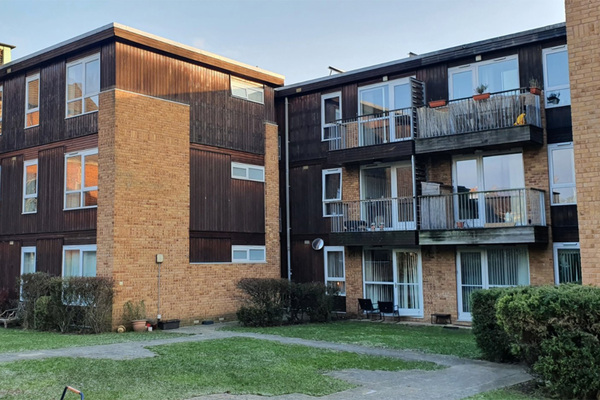The scandal within the scandal: how Help to Buy is sucking funds from cladding victims
Help to Buy leaseholders living in blocks with dangerous cladding face additional barriers put in place by a government body that seems to be moving the goalposts. Jack Simpson investigates. Illustration by Ben Kirchner
When Victoria took out a Help to Buy loan back in June 2017, it was her only option.
With a young family, she wanted to buy her own flat, and – like thousands of first-time buyers – using the scheme was the only way she could achieve this.
“We took out the full 40% equity loan, and the plan was to sell or remortgage a few years after,” she explains.
Two weeks later, unbeknownst to her, that plan would be upended. The Grenfell Tower fire would expose a building safety crisis that brought into question the safety of residential high rises, trapping hundreds of thousands of leaseholders in unsellable homes.
But there is one group caught up in this crisis whose story is not often told.
When they try to sell their homes, Help to Buy (HTB) leaseholders face additional barriers and huge costs that other victims do not. This is made all the more shocking by the fact that the body responsible is a government agency.
Homes England sold HTB as a way of achieving the homeownership dream, but those caught up in the cladding crisis are now facing a homeownership nightmare.
Despite being promised that risk would be shared if the property’s value rose or fell, the agency has repeatedly moved the goalposts to block this, protecting itself from losses from a scheme that was not set up for a flat-sale market crash.
Unable to sell their homes or take bigger equity stakes through paying back the government’s loans, leaseholders are now being hit with sky-high monthly interest charges.
“I’m paying £350 [a month] in interest. If I’m trapped here for five years, I could have to pay £20,000 in interest,” Victoria says. “How am I going to do that? I’m a part-time teacher.”
And her situation is not unique.
An Inside Housing investigation involving interviews with 17 HTB leaseholders has revealed the widespread despair they face and exposed a system set up to frustrate them.
The scheme
HTB was launched by George Osborne in 2013, and was described as the “biggest intervention in the housing market since Right to Buy”.
It aimed to get buyers on the property ladder through government-backed equity loans.
Buyers with deposits as small as 5% of a property’s value could access government loans of 20% of the property’s value, or 40% in London.
Loans would be interest-free for the first five years, with interest kicking in during the sixth year.
When ready, borrowers could sell, or buy out the government’s equity stake in a process known as redeeming. Both cases involve paying back the government’s loan.
This would be based on the same percentage of equity but on the value of the property at the time of sale or redemption, which could rise or fall.
If the value was to drop, the equity percentage would stay the same but on a lower value. The borrower would pay back less than the original loan amount, and the government would take the hit (see below).
How Help to Buy works
If someone buys a £400,000 home and takes out a 20% equity loan from the government, they borrow £80,000.
If the sale price of their property rises to £450,000 at the time of sale, they would still owe 20% of the £450,000 when they sell, so they would have to pay back £90,000.
If someone wants to sell their home and its value decreases from £400,000 to £350,000 at the time of sale, the amount of money they owe will be 20% of that new value, or £70,000.
Homes England and the government loses £10,000.
If there was a widespread property crash, the government could be on the hook for vast sums. But it would take something pretty dramatic to see flat values sink through the floor overnight.
The Grenfell Tower tragedy was that event. After the fire, which killed 72 people, aluminium composite material (ACM) cladding was identified as the main cause of rapid fire spread. Nationwide inspections would reveal that hundreds more buildings were wrapped in these materials.
Many included HTB properties, and the 1,000-home New Capital Quay building in Greenwich, London, was one of them. Leaseholders living in the development faced a combined remediation bill of up to £40m.
While many HTB leaseholders in the block worried about how they were going to pay the bill, others began to wonder what impact this may have on the value of their flats, and whether they could redeem at a fraction of the price.
Some acted on that curiosity.

In the most extreme case, a woman saw her flat valued at just £50,000 because of the cladding, down from the £500,000 she bought it for. Because of the risk-sharing rules of HTB, Homes England virtually wiped off the debt, and the leaseholder had to pay only £10,000 to redeem the loan, costing Homes England £75,000.
Some had already worked out what this meant.
In June 2018, Matthew Pennycook, Labour MP for Greenwich and Woolwich, warned that the government could face huge losses if others followed.
But Homes England was clear. “The basis of the loan is that government shares in both the upside and downside of market valuations,” it said at the time. “This is a matter of public record and is made very clear in the buyers’ guide.”
Behind the scenes, that guidance was changing. Other New Capital Quay residents followed their neighbours but were rebuffed.
Homes England and Target HCA, the private company contracted to manage HTB, had snuck out new guidance.
The new May 2018 guidance clearly stated that the companies had to be told by leaseholders if their block was affected by novel issues and that Homes England reserved the right to agree on a surveyor to carry out the valuation.
“The basis of the loan is that government shares in both the upside and downside of market valuations, this is a matter of public record and is made very clear in the buyers’ guide”
Homes England, May 2018
Aggrieved by this apparent moving of the goalposts, some leaseholders complained.
Homes England said that if a home was affected by cladding issues, it could agree a valuer, and even get a second opinion to “ensure the interests of borrowers and taxpayer” were protected.
This gave Homes England more control of the valuation process.
Homes England told Inside Housing that the HTB mortgage always provided Homes England with the right to agree valuers and the change in 2018 re-iterated the contractual position.
A Freedom of Information Act request by Inside Housing revealed that since the HTB scheme began in 2013, 171 equity loans had been redeemed in ACM-clad blocks.
Of these, 135 had been redeemed at more than the original amount with gains of £1,011,215, or just over £7,490 for each flat. However, it did still lose money on some properties, and heavily: 36 properties to be exact, at £476,410, or nearly £13,233 per flat.
But Homes England had more to worry about.
The growing problem

By late 2018, it was clear that the cladding scandal extended far beyond ACM.
Government advice brought into scope buildings with other potentially dangerous cladding materials of any height, which needed remediating. Hundreds of thousands more flatowners were now embroiled, including HTB borrowers.
Of the 328,506 properties that were lent to under the first HTB scheme up to March 2021, 57,029 (18%) were flats. Not all would be affected but the majority of blocks would have been caught up in the scandal in some form.
What is more, a lot of HTB equity, or taxpayers’ money, would be held in these properties.
Research for Inside Housing by Neal Hudson, housing market analyst at BuiltPlace, looked at the current total HTB loan amounts and property types across more than 350 local authority areas. From this, he estimates that just over £7bn in equity loans has gone towards flats since HTB began.
If we reduce that figure by 21% – the percentage of HTB equity loans that have been redeemed across the programme – the amount of equity still tied up in flats falls to more than £5.5bn.

With all this government cash tied up in flats that were seeing massive value reductions, the government was at risk of haemorrhaging money if it kept its pre-Grenfell approach.
To stop this, its solution was simple: act as though the cladding did not exist.
For those trying to sell or redeem in 2019, the response was the same – they could sell homes with dangerous cladding but only at “unaffected market value”.
Put simply, you could sell or redeem your flat wrapped in dangerous materials that may cost vast sums to fix, but only if you could get a valuation or a buyer willing to ignore these costs.
This was an impossible task.
One surveyor tells Inside Housing: “Homes England would just keep moving the goalposts a little bit every time, which made it more and more difficult for leaseholders.”
There was no public guidance on this either.
Last year, Inside Housing spoke to several leaseholders who were unable to redeem or saw their sales fall through when they found out about this rule after a buyer had been found, often spending hundreds on solicitor and administration fees.
And that is how it stayed until last summer, when Homes England unexpectedly updated its policy.
In a complete 180, the new note said the presence of cladding should no longer be disregarded and surveyors should “consider cladding on a building and its impact on market value”.
The only stipulation was that leaseholders must employ a “specialist valuer”, which the agency estimated would cost around £1,500 plus VAT, a steep rise from the £200-£400 usually charged for HTB valuations.
Surveyors also now had to estimate and factor in the costs of remediation work to valuations, and work out who was responsible for the costs and whether the leaseholder had any other means to pay them.
This was good news for HTB leaseholders. Their homes could now be valued, people could sell, and those who wanted to redeem could, and potentially at much-reduced prices.
Naturally, many frustrated HTB leaseholders began trying to find a “specialist valuer”.
There was just one problem: there were none.
Inside Housing has spoken to several leaseholders who have attempted to find surveyors, with nearly all of them failing. One leaseholder contacted 15 different local surveyors.
We also emailed 30 HTB valuers. Of those that came back, all said that that they didn’t do these cladding valuations. Some said that it was hard to be accurate due to a lack of comparable flats that had sold, while others cited a lack of appetite from professional indemnity insurers to cover firms valuing affected blocks.
Even for those surveyors willing to carry them out, there was no guarantee they would be accepted.
“I just don’t do them anymore. They ask you for so much and I haven’t had any cladding valuations accepted,” one London-based surveyor says. “[Homes England and Target] want to give the impression that they will accept but the reality is, you go down the process and they will find a reason to block it.”

Homes England told Inside Housing that it set up a system earlier this year to help those struggling to find a surveyor, where they could refer their request to the Royal Institution of Chartered Surveyors (RICS) president, who would pick one for them. This costs an extra £450.
Inside Housing has spoken to one leaseholder who has paid the money and is going through this process. She had a surveyor chosen by RICS in January, but six months later she is still waiting for the valuation.
Inside Housing has been able to find just one surveyor who has successful valuations through HTB.
“I’ve probably done a handful of ones on blocks with cladding and several have gone through,” says Paul Holford, chartered valuation surveyor at Morgan Sloane Chartered Surveyors, in Colchester.
He says it does require a bit more legwork but it is possible to get it accepted, if your evidence is strong.
He does concede though, that he has only found two others doing these valuations despite high demand.
Last October, Peter Denton, chief executive of Homes England, said the body was trying to establish a fully procured framework of specialist valuers. Eight months later, there is still no framework.
Find it interesting when he says it is homeowner's (11 leaseholder) responsibility to get their own valuation before redemption. Then follows it up by describing how hard Homes England (1k staff org) have found it in finding surveyors who are willing to carry out these valuations
— Jack Simpson 💚 (@JSimpsonjourno)Find it interesting when he says it is homeowner's (11 leaseholder) responsibility to get their own valuation before redemption. Then follows it up by describing how hard Homes England (1k staff org) have found it in finding surveyors who are willing to carry out these valuations
— Jack Simpson 💚 (@JSimpsonjourno) November 15, 2021
Inside Housing has seen an email to one leaseholder in which she is told that Homes England was starting a waiting list for those facing valuation issues.
However, it also added that there was “no estimated turnaround time for this process”.
Bureaucracy and communication

Being left in the dark is something HTB leaseholders are becoming all too familiar with.
While Homes England is the body officially tasked with managing HTB, it outsources the administration of the mortgages to Target HCA, a subsidiary of Indian IT giant Tech Mahindra.
If someone wants to sell a house or redeem a loan, they go through Target. There is actually a directive at Homes England that staff should not interact directly with borrowers.
Almost all of the HTB loanholders we spoke to reported huge delays in getting updates on the status of their applications from Target.
Charlotte secured a valuation for her London property in the first week of January, which saw the value given at £475,000, down from the £600,000 they initially paid. On receiving this valuation, she quickly it sent off to Target for approval but has been waiting ever since.
“I ring them every few days and they just can’t give me any sense of how long. They just say, ‘There is a backlog,’” she says.
Inside Housing has heard many similar complaints.
One leaseholder put his valuation through to Target in December last year.
Because it came in more than 10% lower than the original price, it was then sent to Homes England’s legal team, and this is where it has stayed.
“I call Target HCA one to two times every week and they never have any updates or timelines and can’t explain why it is taking so long,” explains the leaseholder, who has had to cancel his wedding because of the uncertainty.
The delays are causing even more concern because under HTB rules, a valuation is only valid for three months and can be cancelled once it passes that point.
Target says that it “understood” and “sympathised” with leaseholders’ frustrations, but when complex cases like cladding issues emerge, it is obliged to refer these cases to Homes England for review. Because of the complexity of these cases, Homes England is unable to provide timescales, it added. It also said that since November, it has endeavoured to improve its communication by providing periodic updates.
Target’s contract with Homes England will expire in November, with a new company chosen to take over.
“I ring them every few days and they just can’t give me any sense of how long. They just say, ‘There is a backlog’”
Some residents say it feels as if Homes England and Target have been playing for time and trying to ride out the redemption requests until a solution is found.
And the government is edging closer to a partial solution.
Directives by housing secretary Michael Gove have brought in more protections for leaseholders against sky-high remediation costs. Yet, while there may be protections from remediation costs, HTB leaseholders still face the monthly interest costs and difficulties remortgaging.
The interest starts to bite

With more and more of these borrowers now breaching the five-year threshold, the interest is starting to bite.
Nearly every HTB borrower Inside Housing spoke to was paying between £85 and £450 a month in interest. And this grows by Retail Price Index (RPI) plus 1% every year, a scary thought with RPI topping 11% in April.
These costs are having crushing impacts.
Sarah, who is on the First Time Buyers’ Initiative – a precursor to HTB – saw two sales on her Bristol flat fall through last year because of Homes England’s cladding rules.
She is now £4,000 in interest arrears after being on furlough and is only able to pay £250 of her £350 monthly interest payments, and has been regularly going to the foodbank because of her financial issues.
To add insult to injury, up until recently she would receive texts from Target reminding her of her debt. She had received 42 at the last count.
This is on top of higher mortgage rates for many HTB leaseholders.
HTB borrowers cannot remortgage on terms that most borrowers would be able to, because the loan to value ratio is too high. This often leaves them being put on higher or variable rates.
One leaseholder, Adam (not his real name), who lives in a block in Southwark, breaks down the spiralling costs he now faces on a monthly basis.
“We are hit with £350-a-month HTB interest, our mortgage has gone up by £250 because we have been moved onto a standard variable rate,” he explains. “Our service charge is now £1,600 for the first three months of the year because of the fire safety issues – that’s four times higher than when we first moved in.”
These escalating costs have led to calls for the government to put in place an interest holiday.
But the government will not budge. When asked last year about the prospect of an interest-free holiday, then-housing minister Christopher Pincher said that it was not being considered.
“There are no plans to extend the interest-free period on Help to Buy equity loans”
Christopher Pincher, March 2021
Giles Grover from the End Our Cladding Scandal campaign urged the government to review this. He says: “Homes England may declare that it has revised its guidance to take fire safety issues into account, but its specialist valuation process is clearly not fit for purpose and is yet another example of warm words that are not followed by commensurate action on the ground.”
A Department of Levelling Up, Housing and Communities spokesperson said that it was currently investigating the issues raised and reviewing the process.
They added that the government was determined to provide protection for leaseholders in this situation and were working with Homes England to find solution and ensure cases are dealt with as quickly as possible.
The legal question
There are also questions over the guidance Homes England is giving to leaseholders and surveyors.
Rawdon Crozier, a property barrister at KBG Chambers who is ranked in the Legal 500, has been instructed by a number of HTB borrowers.
He believes that what Homes England is asking surveyors to take into account when carrying out valuations conflicts with normal valuation principles or the terms of the HTB mortgage, and believes it could be challenged.
He points out that in the mortgage agreement, the “market value” of the property should be “as at the date of receipt of the borrower’s application”, meaning in most cases future remediation work should not be taken into consideration in valuations.
Mr Crozier has also taken issue with reasons given by Homes England for why HTB leaseholders cannot redeem on cladding-affected properties – for example denying that its nominated agent had authority to agree a surveyor or raising delays that Homes England itself had brought about.
“While the time limits under the HTB mortgage are tight, the borrower has a fair measure of control over the redemption process and, as long as borrowers follow the terms of the mortgage, they ought to be able to put themselves in a position to bring a redemption action to get a court to order that the mortgage is redeemed,” he says.
“Homes England is being so obstructive because under the valuation there would be massive reductions on these equity mortgages, they would be taking on huge losses”
Homes England also often points to Clause 4.6 of the mortgage agreement, which states that “the seller must perform all restrictive and other covenants, all building regulations and restriction conditions, and stipulations for the time being affecting the mode of the user or enjoyment of the same or any part of the property”.
Mr Crozier believes that the use of the word “property” is important here, as in most cases the property is defined in the lease as just the internal parts of a flat and does not include the exterior elements of the block, such as cladding.
This means that a valuation for redemption requires that the ‘property’ – not the building’s facade – is in a good condition, and that the leaseholder has met their covenants if there are no issues with its inside.
“Homes England is being so obstructive because under the valuation there would be massive reductions on these equity mortgages,” he explains. “They would be taking on huge losses.”
Many lessees have been reluctant to resort to litigation, but Inside Housing has found one person taking those steps.
Adam has been embroiled in a two-year battle with Homes England, but due to growing frustration, he has now instructed a solicitor with a view to taking action.
“Even after outlining what the process for staircasing a property with cladding issues is, they have thrown lawyers our way to try and find any way to wriggle out of letting us do this,” Adam says. “I have just had enough, and taking them to court seems to be the only way to be able to staircase successfully.”
Faced with seemingly impossible barriers put in front of them by Homes England’s ever-changing rules, it is easy to understand the growing feeling among leaseholders that they were mis-sold the scheme.
At the start of the year, the government promised that leaseholders would not pay a penny towards cladding remediation.
And yet while that might be true for remediation, HTB leaseholders are now being forced to pay monthly charges of hundreds of pounds because of dangerous cladding they had no responsibility in putting up.
Even more frustrating is that the recipient of this money is the government itself.
Homes England’s full response
We understand that Help to Buy: Equity Loan customers who wish to pay back their loans are looking to do so as soon as possible.
For properties with ongoing building safety issues – most notably, those with unsafe cladding around their homes, usually flats – we are aware of the additional challenges faced and we are extremely sympathetic.
We cannot comment on individual cases.
Homes England, as a responsible lender, fully supports the government’s efforts to find solutions for these buildings and was an early adopter of the External Wall System (EWS) process introduced by the Royal Institution of Chartered Surveyors (RICS).
Since the Grenfell Tower tragedy in 2017, suitably qualified EWS1 assessors are experiencing a high demand for surveys on buildings with cladding, which has led to challenges for all organisations and customers who rely on property valuations for loan redemptions.
Homes England recognise that it is unlikely the terms of borrowers’ flat leases would make them responsible for building maintenance and repairs.
As national building safety policy has evolved, so too has our response to support our customers.
In recognition of the difficulties faced by borrowers, in August 2021, Homes England published further guidance to assist with unlocking redemptions.
Importantly, this included a guidance note for valuers, which valuers are required to counter sign and confirm that they are suitably qualified and able to comply with Homes England’s requirements.
Where a borrower’s property is affected by unsafe cladding, we offer a process to enable redemptions of their loans to go ahead, although this will usually take longer than a standard redemption request, due to the complexities arising from the cladding and any other fire safety matters identified in the survey and EWS1 form.
If our customer needs a specialist survey to value their property for redemption purposes, we provide guidance on the qualifications required by the surveyor to the borrower, so that they can find a suitable valuer of their property.
Earlier this year, we set up a process to help any of our redemption customers who were struggling to find a valuer, to refer their request to the president of RICS, who will then provide a valuer to them.
We offer to complete the necessary RICS paperwork on behalf of our borrowers, where they have provided evidence to us of three suitably qualified surveyors declining to value their property. We do not charge for this service. Homes England continues to investigate the viability of a surveyors’ panel to improve customer experiences.
Also, because we recognise the challenges facing borrowers whose properties are impacted by unsafe cladding, we have expanded the exceptional grounds on which a Help to Buy home may be sublet to include homes affected by unsafe cladding. Where an issue emerges, such as cladding causing a significant drop in the value of a property, our mortgage administrators are obliged to refer the case to us for review and approval in the interests of establishing a fair valuation for both the borrower and Homes England.
Given the complex nature of these cases, we are unable to provide timescales for how long such individual reviews may take. These procedures exist to ensure taxpayers’ money is being adequately protected and it is our duty, on behalf of the government, to ensure they are correctly followed.
If borrowers are having difficulty with interest payments, we strongly recommend that they contact Homes England’s mortgage administrator as soon as possible.
We are sorry if some customers find the wait for the outcome of their redemption request stressful, but we would urge them and their legal representatives to ensure they follow all our guidance and legal requirements correctly to minimise the risk of undue delay.
We are committed to doing all we can to keep our part of the process running in a smooth and timely way and are continuing conversations to see how it could evolve in the future.


